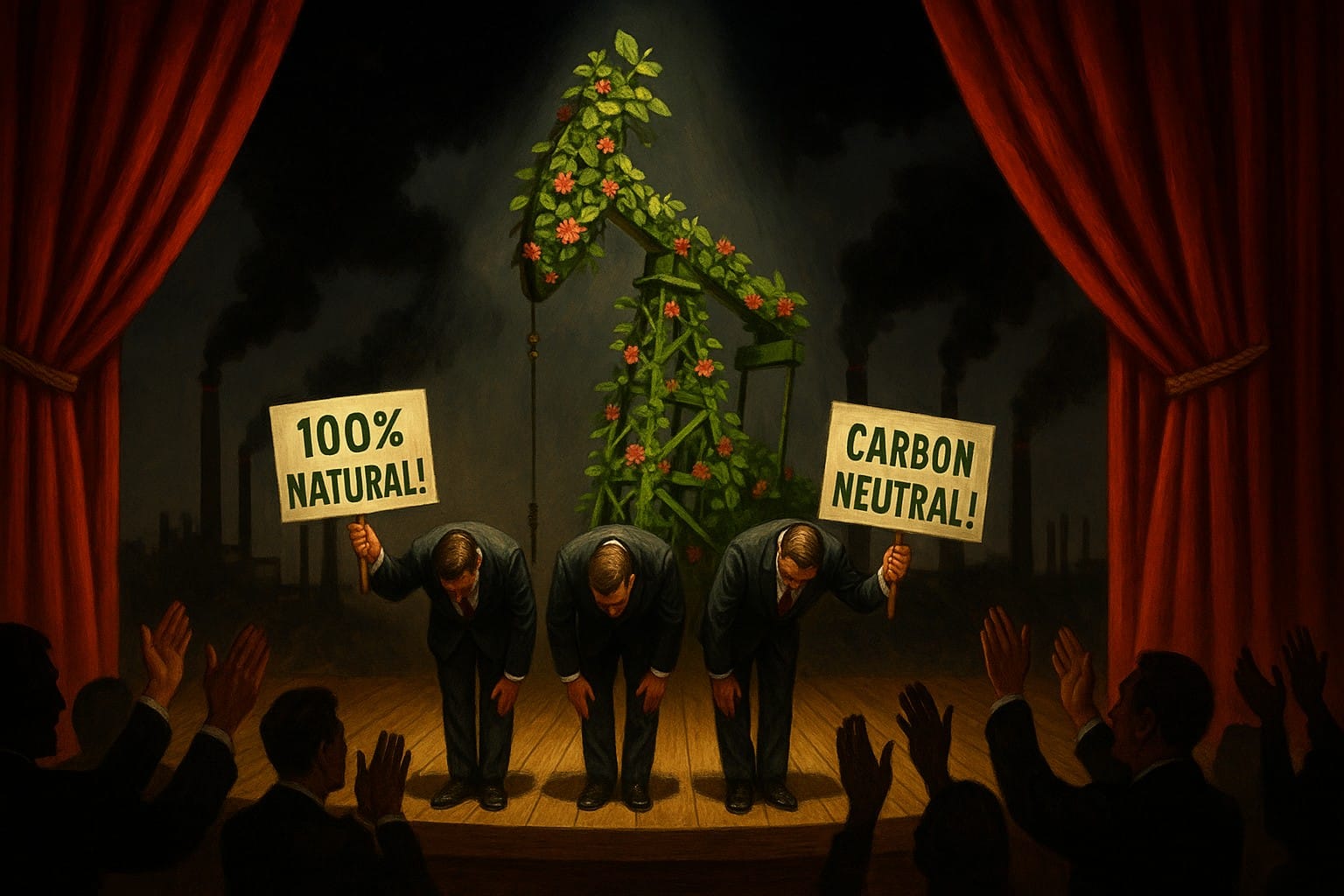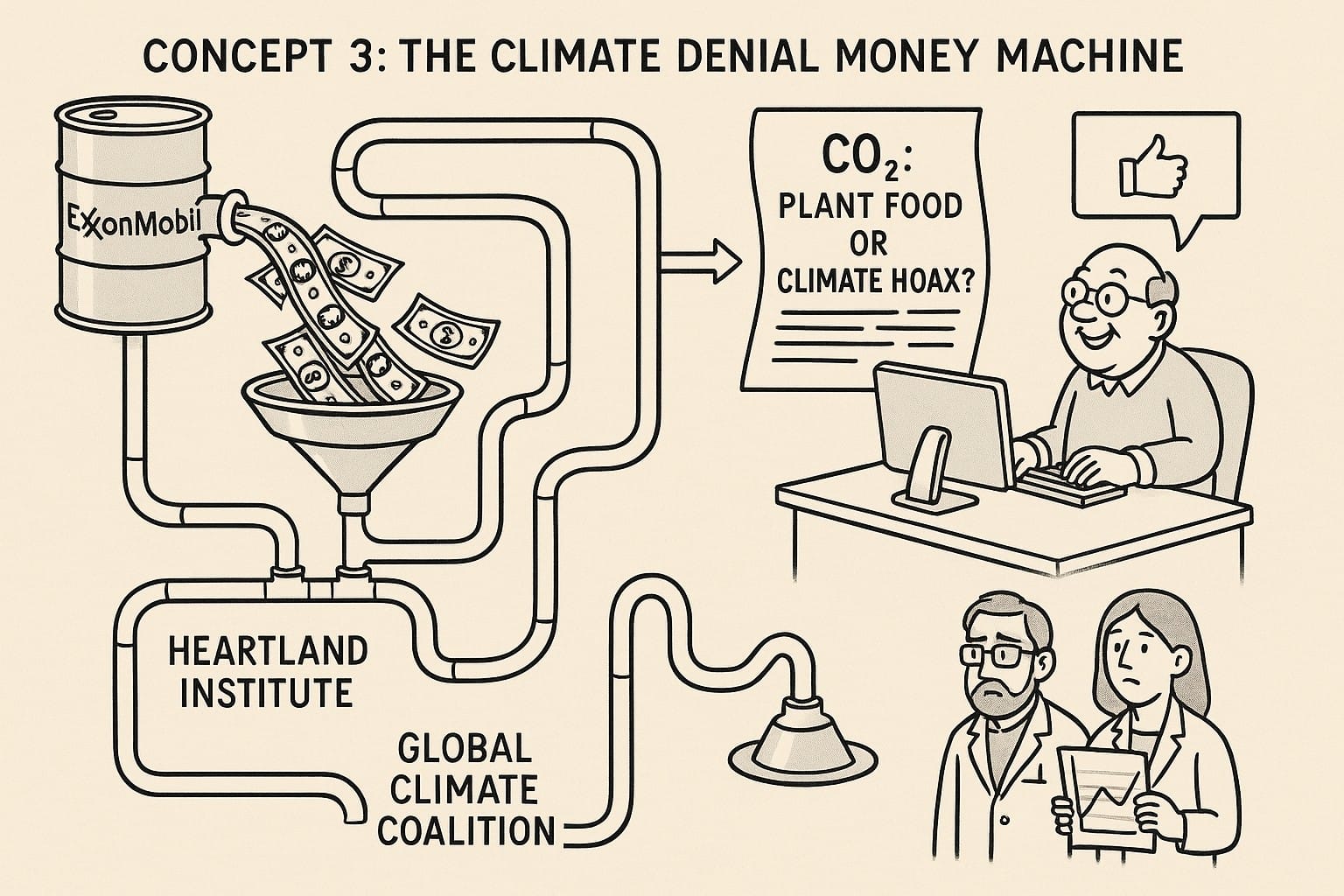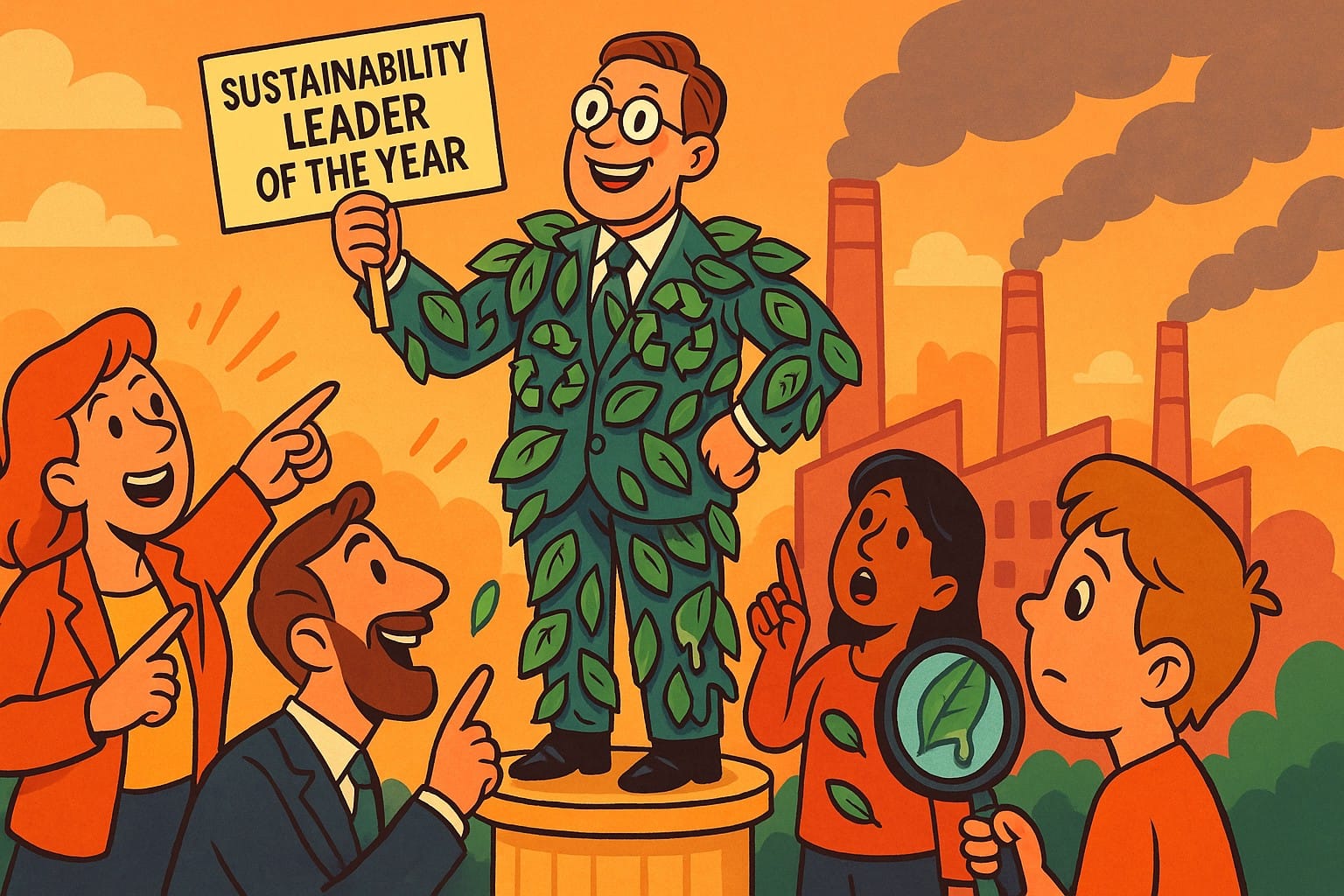*Or: Why your favourite oil company’s carbon-neutral promises are about as authentic as a three-dollar bill*

Let me tell you about one of the most successful marketing campaigns in human history. It’s so effective that millions of people genuinely believe ExxonMobil gives a toss about polar bears, and that buying slightly greener dish soap is basically the same as saving the planet. Welcome to greenwashing: the fine art of making environmentally destructive companies look like Captain Planet’s best mates, armed with nothing more than clever marketing and our seemingly infinite capacity for wishful thinking.
Picture this: you’re BP, a company whose greatest hits include the Deepwater Horizon disaster that turned the Gulf of Mexico into a petroleum smoothie. Your public image sits somewhere between “corporate villain” and “actual cartoon supervillain.” What’s your move? Simple. Rebrand yourself as “Beyond Petroleum,” splash some solar panels across your adverts, and suddenly you’re not an oil company anymore. You’re a renewable energy pioneer who happens to drill holes in the ocean floor as a passionate hobby.
It’s like McDonald’s rebranding as “Mostly Vegetables” while serving exactly the same menu, just with pictures of carrots on the packaging.
The Psychology of Wanting to Be Fooled
The thing that makes greenwashing so devastatingly effective is this: we want to believe it. Desperately. Because the alternative (that our entire economic system relies on slowly heating the planet while we binge Netflix and order things we don’t need from Amazon) feels a bit too existentially horrifying for most people to process over their morning coffee.
So, when Shell announces they’re committed to net-zero emissions by 2050, while simultaneously investing billions in new oil drilling projects, we don’t dig too deeply into the details. We think, “Oh good, someone’s handling the climate thing. Back to worrying about whether my sourdough starter has an Insta-worthy nickname.”
They’re selling us psychological relief as a consumer product. These companies aren’t just flogging us stuff. They’re selling us permission to keep consuming without feeling guilty about it. Absolution with a barcode.

Your Climate-Denying Uncle Isn’t Insane
Before we get too smug about falling for corporate green theatre, let’s spare a thought for your uncle Rich, who insists climate change is a hoax invented by solar panel salesmen and Al Gore. You know the one. He forwards you articles about how CO2 is actually plant food, and believes global warming stopped in 1998 because he found a website that said so.
Uncle Rich isn’t stupid. He’s the victim of one of the most expensive disinformation campaigns in human history.
ExxonMobil alone spent close to $40 million funding climate denial research between 1998 and 2019. That’s not a typo. Forty million dollars dedicated explicitly to creating doubt about their own scientists’ research. Because yes, Exxon’s internal scientists accurately predicted climate change back in the 1970s, then the company spent the next forty years paying other people to explain why those predictions were probably wrong.
Imagine commissioning a study on whether cigarettes cause cancer, getting a definitive “yes, of course they do,” then spending millions funding researchers to argue that correlation doesn’t imply causation and maybe lung tumours are just a natural part of ageing.
The fossil fuel industry didn’t just create doubt. They created an entire parallel universe of climate information. Think tanks with official-sounding names like the “Global Climate Coalition” and the “Advancement of Sound Science Center.”
The Heartland Institute, which sounds like it should be promoting rural healthcare but is a libertarian think tank that spent decades arguing cigarettes don’t cause cancer before moving on to climate denial.
These organizations produced reports that looked exactly like real science. They had footnotes, peer review (sort of), and researchers with actual PhDs. The only difference was that their conclusions were written before the research started, and the study was funded by companies who really, really didn’t want climate change to be real.
Universities have petroleum-funded “research” departments. Scientists built entire careers on finding problems with climate data. Not because the data had problems, but because finding problems paid better than confirming what everyone already knew.
They took the tobacco companies’ playbook for delaying regulation and applied it to the entire atmosphere. Morally horrifying, but strategically genius.
So, when Uncle Rich shares articles about how volcanic eruptions produce more CO2 than all human activity combined (they don’t, by the way, not even close), he’s not being wilfully ignorant. He’s repeating information that cost millions of dollars to produce and was specifically designed to sound plausible to intelligent people who don’t have time to fact-check every climate claim they encounter.
The delicious irony? The same companies now lecturing us about sustainability are often the ones who spent decades ensuring that half the population wouldn’t believe climate change was real in the first place. It’s like an arsonist selling you fire insurance while secretly stockpiling matches.

The Greenwashing Playbook: A Masterclass in Misdirection
The basic technique is surprisingly simple: take one tiny environmentally friendly thing your company does, then talk about it so loudly and so often that people assume it represents your entire business model.
Take Coca-Cola. They’ve spent millions advertising their commitment to recycling and sustainable packaging. Impressive marketing. What they don’t mention quite as loudly is that they produce more plastic waste than any other company on Earth. It’s like a serial killer starting a charity for knife safety. Technically helpful, but missing the rather obvious point.
Or consider the automotive industry’s sudden love affair with electric vehicles. Every car manufacturer now has glossy adverts featuring sleek electric cars gliding silently through pristine forests, driven by attractive people who definitely compost and probably know the Latin names for plants.
But most of these companies are still producing far more petrol cars than electric ones. BMW can show you a lovely advert about their electric future while their actual production line churns out SUVs that get about seven miles to the gallon. It’s like a tobacco company advertising their new line of organic cigarettes while quietly increasing production of their regular lung-destroying varieties.
The Language of Corporate Environmentalism
The linguistic gymnastics involved in greenwashing deserve their own Olympic category. Companies have developed an entire vocabulary designed to sound environmentally conscious while meaning absolutely nothing.
“Carbon neutral” is a particular favourite. Sounds impressive, doesn’t it? But it usually means “we’ve bought some carbon offsets from a tree-planting scheme in Guatemala, so technically our emissions are balanced out by some saplings that may or may not survive the next drought.” It’s environmental accounting that makes Enron’s bookkeeping look straightforward.
“Sustainable” is another classic. Sustainable what? Sustainable profits? Sustainable shareholder returns? Sustainable ability to extract resources from the planet while maintaining plausible deniability about the consequences? The word has been so thoroughly strip-mined of meaning that you could probably market “sustainable arsenic” and someone would buy it.
And don’t get me started on “natural.” Water is natural. Uranium is natural. Cyanide is gloriously natural. Natural doesn’t mean good for you. It just means it exists somewhere in nature, possibly in the digestive system of something that wants to kill you.
The Offsetting Shell Game
Carbon offsets deserve special mention because they represent greenwashing at its most mathematically creative. The basic idea is simple: if you emit carbon over here, you can pay someone to remove carbon over there, and it all balances out. Environmental double-entry bookkeeping.
In practice, it’s often more about paying someone to promise, maybe to plant some trees at some point in the future, while you continue pumping greenhouse gases into the atmosphere right now. It’s the environmental equivalent of eating seventeen cheeseburgers but claiming you’re on a diet because you’ve bought a gym membership you never use.
Some offset schemes are genuinely helpful. Others are about as legitimate as an email from a Nigerian prince offering to share his oil fortune. The problem is that for most consumers, they all look equally impressive on corporate websites featuring stock photos of happy families frolicking in suspiciously photogenic forests.
The Packaging Performance
Let’s talk about the theatrical masterpiece that is modern product packaging. Walk down any supermarket aisle and you’ll see more green imagery than a David Attenborough documentary. Leaves, trees, flowing water, and pictures of the Earth from space. It’s like the entire consumer goods industry discovered Photoshop’s nature filter and went absolutely mental with it.
Unilever puts a little green leaf on their shampoo bottles, and suddenly you’re not buying industrial detergent for your hair. You’re participating in a sustainable lifestyle revolution. Never mind that the stuff inside is the same petrochemical cocktail they’ve been selling for decades. The packaging has leaves on it, so it must be better for the planet.
You can now buy “eco-friendly” single-use plastic products. Think about that for a moment. Environmentally friendly things designed to be thrown away immediately. It’s like selling “sustainable dynamite” or “carbon-neutral cigarettes.” The cognitive dissonance required to market these products without bursting into laughter must require industrial-strength antidepressants.
The Greenwashing Industrial Complex
The awe-inspiring thing about greenwashing is how it’s created an entire secondary economy of environmental theatre. Companies now employ armies of sustainability consultants, carbon accountants, and green marketing specialists whose job is essentially to make destructive practices sound environmentally responsible.
These aren’t necessarily bad people. Most of them probably genuinely care about the environment. But they’re working within a system where the solution to environmental destruction is better marketing rather than, you know, less ecological destruction.
It’s like hiring a team of publicists to convince people that smoking is healthy rather than just making cigarettes less deadly. Technically impressive from a communications standpoint, but missing the rather obvious alternative approach.
Why It Works So Bloody Well
Greenwashing isn’t effective because people are stupid. It works because it exploits a perfectly reasonable psychological response to an overwhelming problem. Climate change is genuinely terrifying and genuinely complex, and the real solutions involve massive systemic changes that feel impossibly difficult to achieve.
So, when someone offers us a simple alternative (buy this slightly greener product and you’re part of the solution!), we grab it desperately. Even if, deep down, we suspect that switching to bamboo toilet paper isn’t going to offset the environmental impact of flying to Thailand for a holiday.
It’s hope as a marketing strategy. And hope, as it turns out, is incredibly easy to monetize.
The Backwards Logic of Green Marketing
Here’s the thing that always gets me about this whole situation. The companies spending the most money convincing you they care about the environment are usually the ones doing the most damage to it. It’s almost mathematical in its precision: the bigger your carbon footprint, the bigger your sustainability marketing budget.
Shell spends millions on adverts about their clean energy future. Meanwhile, they’re drilling new oil wells in the North Sea. H&M launches a “conscious collection” made from recycled materials. Meanwhile, they’re still churning out fast fashion at a pace that would make a cocaine dealer jealous.
You know what genuinely sustainable companies are doing while this is happening? Sitting in the corner, trying to figure out how to afford a basic website. The local farmer using regenerative agriculture can’t compete with Unilever’s computer-generated forest campaigns. The small business that’s actually carbon neutral can’t afford the marketing consultants needed to tell everyone about it.
It’s like watching someone who drinks a bottle of wine every night lecture you about the dangers of alcohol while the person who has one glass with dinner sits quietly reading a book. The loudest voice in the room is usually compensating for something.
So, when you see BP advertising their renewable energy investments, remember they’re still one of the world’s largest oil companies. When you see a fast fashion brand launching a sustainable line, remember they’re asking you to buy more stuff to save the planet.
We’re not looking at corporate responsibility here. We’re watching expensive theatre, designed to make us feel better about shopping our way to environmental collapse. The costumes just happen to have leaves on them now.

Want more analysis of how we’re all getting manipulated by corporate marketing? Subscribe to get articles like this delivered directly to your inbox, where algorithms can’t decide whether you’re worthy of reading them.*
I don't sell memberships or anything, but if you want to buy me a beer, I won't refuse.


